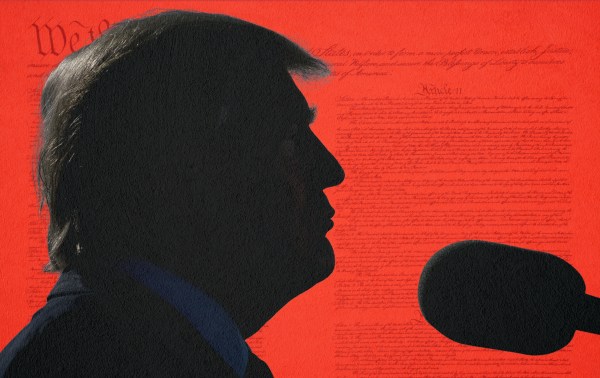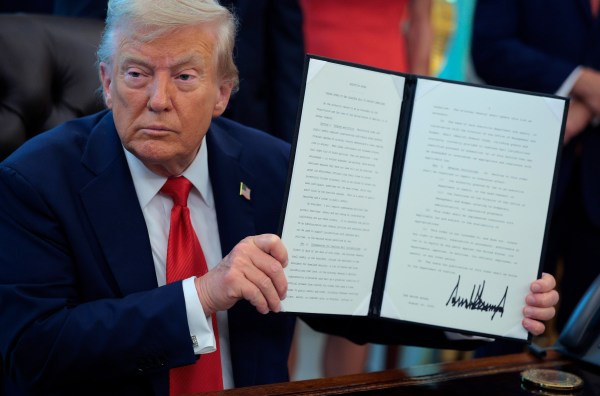We begin with two quotes, possibly related. The first comes from the New York Times’ “Trump whisperer,” Maggie Haberman.
The second, allegedly, comes from Trump himself. As Asawin Suebsaeng writes in Rolling Stone:
As he lays the groundwork for a 2024 presidential run, Trump has talked to close associates about who he’d tap for top government positions should he win back the White House, and [Marjorie Taylor] Greene has repeatedly made his list, two sources familiar with the matter tell Rolling Stone.
“Wouldn’t she be great?” Trump privately said earlier this year to a confidant, one of the two people says. It is unclear what specifically Trump has in mind for the severely MAGAfied Georgia Republican, be it a White House staff position, cabinet post, or agency appointment, the sources say. But, “he loves MTG and would want her very close in a second term, that much was clear,” one source says.
The second source recalls that over the past year, the ex-president had briefly mentioned Greene’s name as someone who could be in the running to be a senior official at the Justice Department during a second Trump administration. The former president’s comment confused the source, because “I don’t think she’s a lawyer,” this person says.
She is not, in fact, a lawyer. But she’s blindly loyal and plenty spiteful, which makes her the ideal Trump second-term Cabinet appointee. If, like him, you live by a motto of “for my friends, everything, for my enemies, the law,” you could scarcely do better than a clownish fanatic like Greene as your top law enforcement official.
“She’d never get confirmed,” you might say. “Even a Republican-controlled Senate wouldn’t rubber-stamp her.” Maybe. Mitch McConnell’s majority did spike a few nominees during Trump’s first term. But the Senate GOP caucus circa 2025 will look quite a bit different from the caucus of 2019. If a red wave sweeps the party to power next month, as seems probable, nationalists like J.D. Vance and Blake Masters—both endorsed by Greene—will join the chamber. The 2024 Senate map also heavily favors Republicans, portending more Trump flunkies flooding into McConnell’s conference.
By the time Trump is sworn in again, the GOP could have 55 or more Senate seats. There may not be enough Mitt Romneys and Susan Collinses left to block a nominee like Greene. Senate Republicans who are privately leery of elevating her to an important administration job might look at the results of the recent election and conclude that populist cranks in key positions is what the American people want. It’s certainly what their base wants.
But let’s say I’m being too pessimistic, that even a MAGA-flavored Senate majority wouldn’t stoop to confirming Greene. McConnell might refuse on principle to bring her nomination to the floor for a vote, say. Trump would therefore be unable to obtain the advice and consent of the Senate for his nominee, which means MTG as AG at the DOJ would be DOA. Right?
Don’t be so sure.
Indulge me two more quotes. The first comes from Alexander Hamilton, writing in defense of granting the Senate a veto over the executive’s nominees in Federalist No. 76.
It would be an excellent check upon a spirit of favoritism in the President, and would tend greatly to prevent the appointment of unfit characters from State prejudice, from family connection, from personal attachment, or from a view to popularity. In addition to this, it would be an efficacious source of stability in the administration.
It will readily be comprehended, that a man who had himself the sole disposition of offices, would be governed much more by his private inclinations and interests, than when he was bound to submit the propriety of his choice to the discussion and determination of a different and independent body, and that body an entire branch of the legislature.
Some 231 years later, a president governed entirely by his private inclinations and interests exulted over his ability to fill executive vacancies with unfit characters answerable only to him.
“I sort of like ‘acting’ [directors]” Trump said in 2019 to reporters when asked why so few of his agency heads had been nominated for Senate confirmation. “It gives me more flexibility; do you understand that? I like ‘acting.’” His whole life has been an exercise in unaccountability. He dislikes the Senate’s power of advice and consent for precisely the reasons Hamilton celebrated it.
And not just theoretically. As president, he walked the walk.
Did you know that, in four years, with his own party in charge of the upper chamber, Trump never got someone confirmed to lead the Bureau of Land Management?
Or the Drug Enforcement Administration?
Or that, for nearly half his term, he had no Senate-approved secretary of Homeland Security?
Midway through Trump’s presidency, 22 of the 42 top Cabinet officials were serving in an acting capacity, without confirmation. Amazingly, that number accounted for more than a quarter of all acting Cabinet officials under all presidents dating back to 1977.
His insistence on promoting handpicked loyalists in “acting” roles despite legal barriers to doing so often led to … creative solutions.
In 2018, you may recall, he finally hounded Jeff Sessions out of his job as attorney general. By law, Deputy AG Rod Rosenstein should have succeeded him as acting AG. But that was a nonstarter for the president, who resented Rosenstein for his role in overseeing the Mueller probe. So Trump promoted Sessions’ chief of staff, Matt Whitaker, to be acting attorney general instead. Legal opinion split on whether the appointment was constitutional, with some arguing that it was valid under existing statutes because it was temporary and filled a vacancy created by a resignation, not a death. Others insisted it was unconstitutional inasmuch as Whitaker was wielding powers reserved for constitutional officers who are subject to Senate confirmation.
Little did either side know, though, that the Whitaker matter would be one of the less questionable maneuvers Trump would use to fill a major vacancy.
In 2019, chaos at DHS led to a game of musical chairs at the top that would end with multiple federal judges ruling that the department’s top officials were serving unlawfully. Kirstjen Nielsen resigned as secretary, which should have cleared the way for Deputy Secretary Claire Grady to replace her as acting department head. But Trump wanted his top guy at Customs, Kevin McAleenan, as acting DHS secretary instead. (McAleenan was, at least, confirmed by the Senate for the Customs job.) So Grady resigned too, clearing the way for McAleenan. Later that year, McAleenan resigned, clearing the way for an undersecretary, Chad Wolf, to become acting secretary.
Meanwhile, Trump was hellbent on making border hawk Ken Cuccinelli his new director at Citizenship and Immigration Services. When the Republican-led Senate refused to confirm Cuccinelli, a longtime critic of Mitch McConnell, the president simply rewrote the rules to get what he wanted. He had the director of CIS resign, then created a new position for Cuccinelli—“principal deputy director”—that leap-frogged him over the existing deputy director. That made Cuccinelli first in line to become acting director by replacing the outgoing director.
Any president might be tempted to appoint a lackey to an unexpected vacancy that opened through exogenous circumstances. But firing Senate-confirmed officials in order to create vacancies that could then be filled by unconfirmable cronies was next-level authoritarian. The Cuccinelli appointment is the moment Trump tore up Federalist No. 76 and flushed it down the toilet.
All hell broke loose the next year. In March 2020, a federal judge in D.C. held that Cuccinelli’s appointment violated the Federal Vacancies Reform Act because he hadn’t served as “first assistant” to the director for 90 days, as the statute requires. The Government Accountability Office ruled that McAleenan’s elevation to acting DHS secretary violated the department’s own regulations, which had been sloppily revised by Nielsen on her final day in office to facilitate his succession. Months later, a federal judge in New York affirmed that Wolf’s appointment to the top job violated the Homeland Security Act, rendering his orders barring new applications to the DACA immigration program null and void.
It gets worse. Under the Vacancies Reform Act, an acting appointee is supposed to be limited to 210 days in office, roughly seven months. William Perry Pendley, Trump’s acting BLM director, served 424 days without Senate confirmation before yet another federal judge put a stop to his tenure. Wolf served 14 months, with Trump’s team arguing that his appointment was governed not by the Vacancies Reform Act but by the Homeland Security Act. (The, er, same statute his appointment violated per the ruling of the New York judge.) One analysis in September 2020 found that at least 15 vacancies in Trump’s executive branch had been filled by acting officials for more than 210 days, all presumably in violation of the VRA.
Pendley was a rare case of a Trump official facing consequences for overstaying his welcome legally. Wolf stuck around until January 2021 despite the court ruling against him, resigning in protest only a few days before the end of Trump’s term over the January 6 insurrection. Cuccinelli remained at CIS to the bitter end.
In the few instances when Trump did face some institutional pushback for appointing officials illegally, his administration did exactly what you’d expect them to do. They shrugged.
There were, in other words, few repercussions for the president for having repeatedly flouted constitutional and statutory restraints designed to vindicate Hamilton’s vision of making top executive appointees accountable to the legislature. And to the extent there were repercussions, they came from the courts, never from Congress.
As far as I’m aware, despite two years of total Democratic control, Congress has done jack squat to address any of this. Instead they’ve been consumed with reforming the Electoral Count Act, which is understandable. Narrowly dodging death at the hands of a mob rampaging through your place of business will tend to focus your mind on that particular problem.
But they should maybe start considering the possibility that Trump will win the next election fair and square. And if he does, what will they have achieved over the past two years to make it harder for him to abuse his power while in office?
Anything?
David Frum likes to say of the prospect of another Trump term that “the velociraptors have learned to work the doorknobs,” alluding to one of the Jurassic Park sequels. That is, Trump and his cronies have surely learned from their first four years in office how to be more effective institutionally at implementing their corrupt schemes. The point of our trip down memory lane above is to remind you how doggedly he’d already begun working the doorknobs in his first term to get yes-men installed in positions where the Senate, or existing law, might have thwarted him.
If that’s how Trump behaved when he knew he would have to face voters again, imagine the impunity with which he’ll act in a second term knowing that he won’t.
Axios reported several months ago that his team is preparing to reinstate an executive order establishing a “Schedule F” employment classification for certain federal workers. Tens of thousands of career civil servants with influence over policy who enjoy job protections under federal law would become at-will employees once they’re reassigned as Schedule F, leaving them to serve at the pleasure of the president. Under a normal president, conservatives might find that something to cheer about. The whole problem with government workers is that they’re less accountable than those in the private sector, right?
But Trump isn’t a normal politician. Schedule F is his way of laying the groundwork for a political purge of the executive branch, replacing career government officials with MAGA fanatics. Which would be alarming under any circumstances, but seems a little more than alarming when we’re not two years removed from him attempting a coup.
If he and his team are willing to purge rank-and-file federal employees, it’s a cinch that they’ll be thinking big for his next Cabinet too. No more James Mattises and Rex Tillersons. The next Cabinet will be all velociraptors—a Cabinet of spite, in Haberman’s words.
And if the Senate won’t play ball with him on that, he’ll just have to work around them. One expert offered a grim preview to the Washington Post of the future of the advice-and-consent power in a Trump second term. “If the president decides they’re going to install a secretary of defense that isn’t actually confirmed, and Congress isn’t going to try to respond with their powers [of the purse] and try to stop that, I think the reality is that there’s not much that you can do,” he said.
Here’s a scenario for you. Imagine that Trump invites Marjorie Taylor Greene to be chief of staff to his new attorney general, some respectable establishment figure who’s duly confirmed by the Senate. Now imagine that Trump fires that person after 90 days and elevates Greene to acting AG. How long can she serve in that role lawfully under the Whitaker strategy?
Under the Vacancies Reform Act, I’m … not sure. Neither are most judges, I’m guessing. But by the terms of the statute itself, conceivably she could go on for well more than 210 days. Under one section, once the president nominates a permanent replacement for a vacancy, the acting director can go on serving beyond the 210 days until the Senate acts on the nomination. If it rejects the nominee, the acting director gets another 210 days from the date of the rejection. If the president offers a second nomination and the Senate rejects that too, the acting director gets another 210 days from the date of that rejection. It’s unclear what would happen with a third nomination.
Conceivably, though, so long as Trump is willing to nominate ridiculous figures destined to be rejected by the Senate—Sidney Powell, say, or Mike Lindell—then AG MTG would remain in place.
Or, instead of the Whitaker strategy, maybe he’ll prefer the Cuccinelli strategy. Instead of pre-positioning Greene in an agency by giving her a subordinate job with an eye to making her acting director, he could simply force a vacancy at the top and then create a position of “principal deputy director” for her, vaulting her into the job.
Maybe the courts would block that. Maybe they wouldn’t.
The only way to deter Trump from staffing up with acting directors is for judges to do what they did with Wolf and Cuccinelli and rule that their official acts have no force of law because they were never lawfully appointed. It would be senseless for Trump to flout statutes in order to appoint yes-men if doing so means that his policies get systematically unwound in court. But it’s also easy to imagine how the judiciary might get nervous and gun-shy about nullifying all acts of an improperly appointed official.
For instance, if Attorney General Greene is deemed to have been appointed illegitimately, would that mean every federal defendant convicted during her term in office must go free? If Defense Secretary Greene carries out the president’s order to deploy the military somewhere, is every soldier in the field acting on illegal orders? Is the entire operation illegal?
Trump being Trump, he’ll do what he wants to do and dare the courts to stop him. And if they try, he’ll blame them for the legal mess he made.
There are things Congress could have and should have done to address all of this but they were too busy obsessing over doomed “messaging bills” like H.R. 1 and codifying Roe v. Wade to worry about it, it seems. It’s nothing less than dereliction of duty, civic malpractice. We’re going to pay a price.







Please note that we at The Dispatch hold ourselves, our work, and our commenters to a higher standard than other places on the internet. We welcome comments that foster genuine debate or discussion—including comments critical of us or our work—but responses that include ad hominem attacks on fellow Dispatch members or are intended to stoke fear and anger may be moderated.
With your membership, you only have the ability to comment on The Morning Dispatch articles. Consider upgrading to join the conversation everywhere.